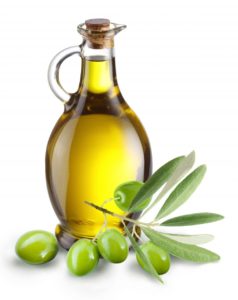 Once again research finds health benefits from consumption of olive oil. A recent large study found that consuming more than 1/2 tablespoon of olive oil per day lowered the risk of death from heart disease, cancer, neurogenerative disease, and respiratory disease.
Once again research finds health benefits from consumption of olive oil. A recent large study found that consuming more than 1/2 tablespoon of olive oil per day lowered the risk of death from heart disease, cancer, neurogenerative disease, and respiratory disease.
The Harvard T.H. Chan School of Public Health researchers also found that increasing intake of olive oil in the diet (replacing margarine, butter, mayonnaise, and dairy fat with 2 1/4 teaspoons or 3/4 tablespoons olive oil) lowers risk of early death in general. The study participants were followed for 28 years, and diet was assessed every 4 years.
Earlier studies found that the best kind of olive oil to consume is extra virgin olive oil (EVOO). Extra virgin olive oil is considered anti-inflammatory, and contains oleocanthal, which has anticancer effects. Health benefits are both if eaten as is (e.g., dunk bread, in salad dressings) or cooked (e.g. roast vegetables, in sauces, cooking foods) - and this result was also found in this recent study.
From Science Daily: Higher olive oil intake associated with lower risk of CVD mortality
Consuming more than 7 grams (>1/2 tablespoon) of olive oil per day is associated with lower risk of cardiovascular disease mortality, cancer mortality, neurodegenerative disease mortality and respiratory disease mortality, according to a study publishing today in the Journal of the American College of Cardiology. The study found that replacing about 10 grams/day of margarine, butter, mayonnaise and dairy fat with the equivalent amount of olive oil is associated with lower risk of mortality as well.
Using participants from the Nurses' Health Study and the Health Professionals Follow-up Study, researchers analyzed 60,582 women and 31,801 men who were free of cardiovascular disease and cancer at the study baseline in 1990. During 28 years of follow-up, diet was assessed by a questionnaire every four years. The questionnaire asked how often, on average, they consumed specific foods, types of fats and oils, as well as which brand or type of oils they used for cooking and added at the table in the previous year.
Olive oil consumption was calculated from the sum of three items in the questionnaire: olive oil used for salad dressings, olive oil added to food or bread, and olive oil used for baking and frying at home. One tablespoon was equivalent to 13.5 grams of olive oil. The consumption of other vegetable oils was calculated based on the participants reported oil brand and type of fat used for cooking at home. Margarine and butter consumption was based on the reported frequency of stick, tub or soft margarine consumption, and the amount of margarine or butter added from baking and frying at home. Intakes of dairy and other fats and nutrients were also calculated.
The researchers found olive oil consumption increased from 1.6 grams/day in 1990 to about 4 grams/day in 2010, while margarine consumption decreased from about 12 grams/day in 1990 to about 4 grams/day in 2010. The intake of other fats remained stable.
Olive oil consumption was categorized as follows:
- Never or <1 time per month
- >0 to ≤4.5 grams/day (>0 to ≤1 teaspoon)
- >4.5 to ≤7 grams/day (>1 teaspoon to ≤1/2 tablespoon)
- >7 grams/day (>1/2 tablespoon)
Over the course of 28 years, there were 36,856 deaths with 22,768 occurring in the Nurses' Health Study and 14,076 in the Health Professionals Follow-up Study. Participants with higher olive oil consumption were often more physically active, had Southern European or Mediterranean ancestry, were less likely to smoke and had a greater consumption of fruits and vegetables compared to those with lower olive oil consumption. The average consumption of total olive oil in the highest category was about 9 grams/day at baseline and included 5% of the study participants.
When researchers compared those who rarely or never consumed olive oil, those in the highest consumption category had 19% lower risk of cardiovascular mortality, 17% lower risk of cancer mortality, 29% lower risk of neurodegenerative mortality and 18% lower risk of respiratory mortality. The study also found substituting 10 grams/day of other fats, such as margarine, butter, mayonnaise and dairy fat, with olive oil was associated with 8-34% lower risk of total and cause-specific mortality. They found no significant associations when substituting olive oil for other vegetable oils.
"It's possible that higher olive oil consumption is a marker of an overall healthier diet and higher socioeconomic status. However, even after adjusting for these and other social economic status factors, our results remained largely the same," Guasch-Ferré said. "Our study cohort was predominantly a non-Hispanic white population of health professionals, which should minimize potentially confounding socioeconomic factors, but may limit generalizability as this population may be more likely to lead a healthy lifestyle."
